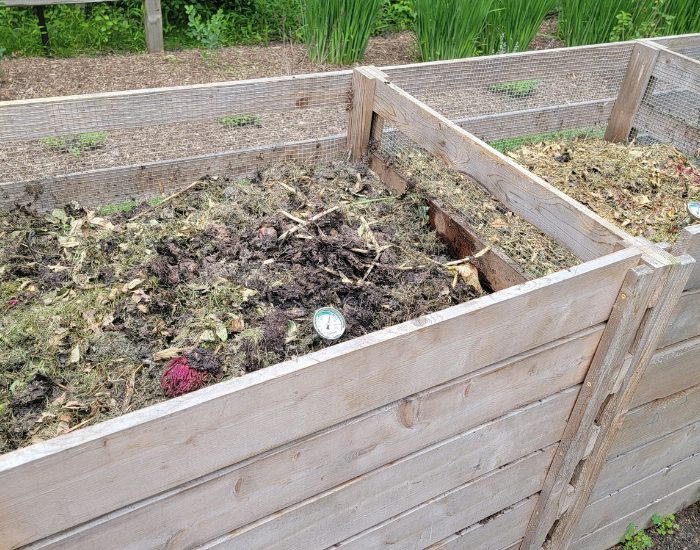By Lee Moncton

A 3-bin home compost system. Photo by Frank Thiemonge on Unsplash
We have all heard that we should add more compost to our garden, in the same way that we have all heard we should eat more vegetables. But do we know the many ways compost helps our plants? Here are some of the important ways in which compost helps your plants grow big and strong.
First, what is compost? It is the result of the decomposition of ORGANIC material most frequently accomplished by combining equal parts of nitrogen rich organic material (greens) with carbon rich organic material (browns) with some water and air in a compost bin. Oh, and don’t forget the key ingredient that does all the work- microbes, like bacteria and fungi, which are usually free as they are everywhere.
Next, it’s good to understand what the components of soil are. About half of soil is made up of inorganic minerals, which are clay, sand, silt, and stones. These are all forms of broken-down rocks from the Earth’s crust. Most of the other half is air and water. But what makes our soil able to support healthy plants is the 5% that is organic material, compost.
Here are five ways compost supports plant life in your garden
Moisture: Compost is very good at holding onto water molecules. Unlike sand which lets water just flow through it, and unlike clay which blocks water, water clings to organic material. Plants, like all other living things on Earth, need water to survive and most of this water comes from the roots where the compost is. In addition to absorbing water, the nutrients in the soil that the plant requires have to be dissolved in this water before they too are then taken up by the roots.
Structure: The physical condition, or tilth, of the soil plays an important role for healthy plant growth. Adding compost helps the soil particles to aggregate and become clumpy and crumbly. This generates spaces in the soil to allow air and water to penetrate and move through it down to the root zone.
pH: All Plants have a preferred range of soil acidity where they absorb nutrients the best. Most garden plants prefer slightly acidic soil, and some plants are more acidic loving (blueberries, hydrangeas). Most plant-based compost is slightly acidic which helps lower pH over time. Mature compost can also help stabilize soil pH by neutralizing extremes.
Microbes: The life in your soil is an important measure of the soil’s health. The microbes in your soil play an essential role in nutrient cycling, which is converting nutrients into the form your plant can uptake. These nutrients affect plant health, growth and disease resistance. Your compost is a terrific source of a diverse community of bacteria and fungi to prepare the food for absorption. Your plants can’t survive without microbes assisting their growth. Microbes and plants evolved together so it’s no surprise that there is an amazing symbiotic relationship between them.
Electrical Charge: Remember the fun you had with static electricity as a kid, or when you pull the clothes out of the dryer? Well electric charge plays a role in your soil too. Many of the nutrient ions in your soil that your plant needs to eat happen to be positively charged ions, called cations, like calcium (Ca++), magnesium (Mg++), potassium (K+), and iron (Fe++). And because these ions are water soluble, we want the soil to hang on to these and not let heavy rains wash them away. Fortunately, organic compost is negatively charged and when it is incorporated into your soil it can help to hold onto these nutrients and keep them from being leached away.
The best compost for the job is the compost you can make in your own backyard from your own organic material. That way you know what has gone into making it and what hasn’t (no plastics, PFFs, pesticides, herbicides, manure, diseases). And since the compost in your garden gets consumed by the plants and microbes in your soil, it is important to replenish this organic material in your soil by giving your garden a serving of compost yearly. And don’t forget, eat your vegetables.